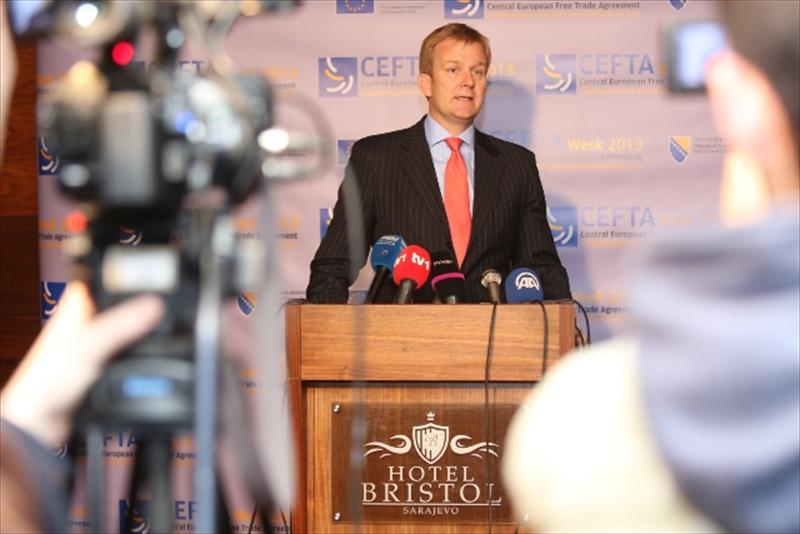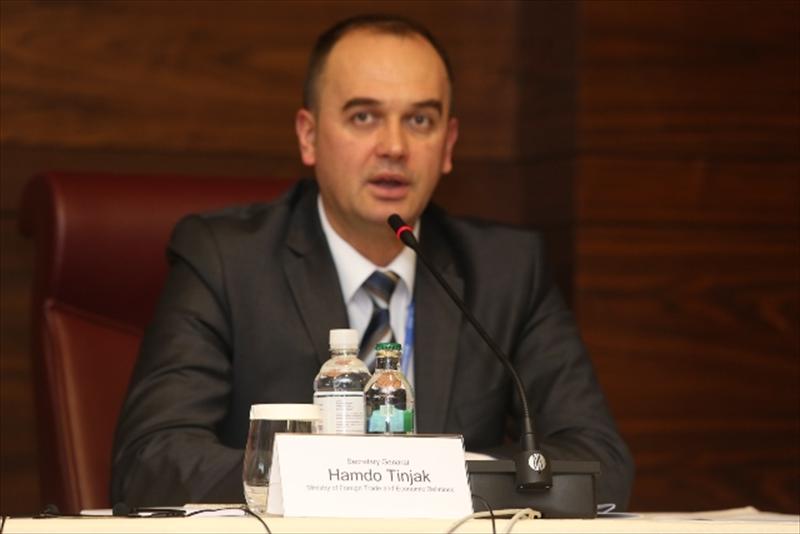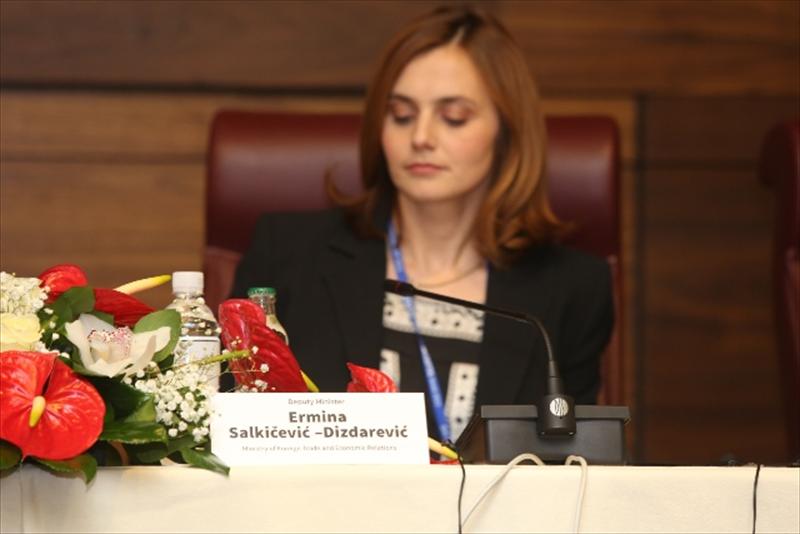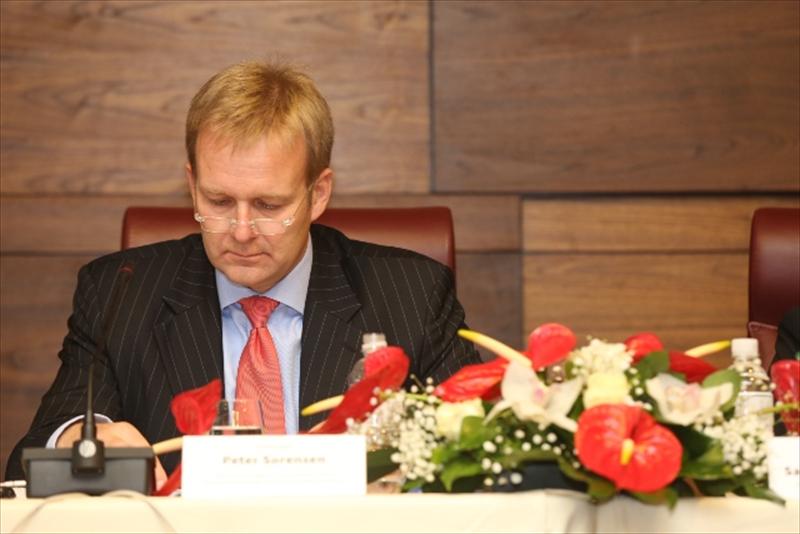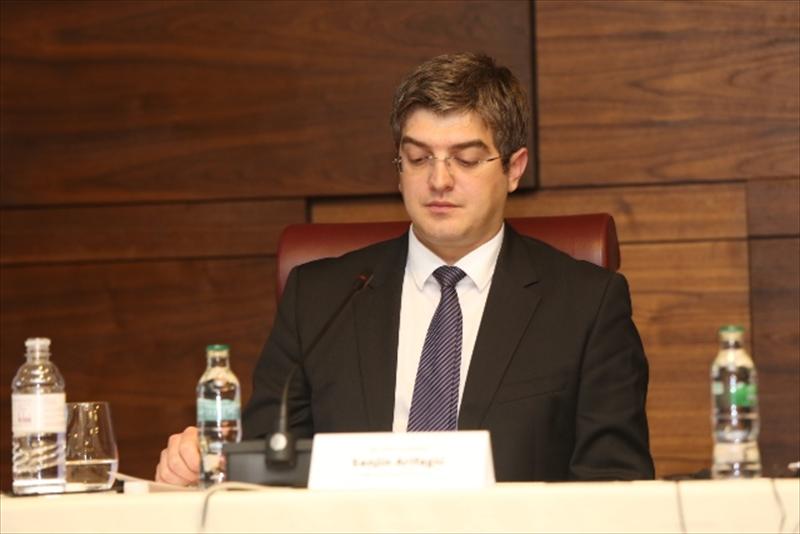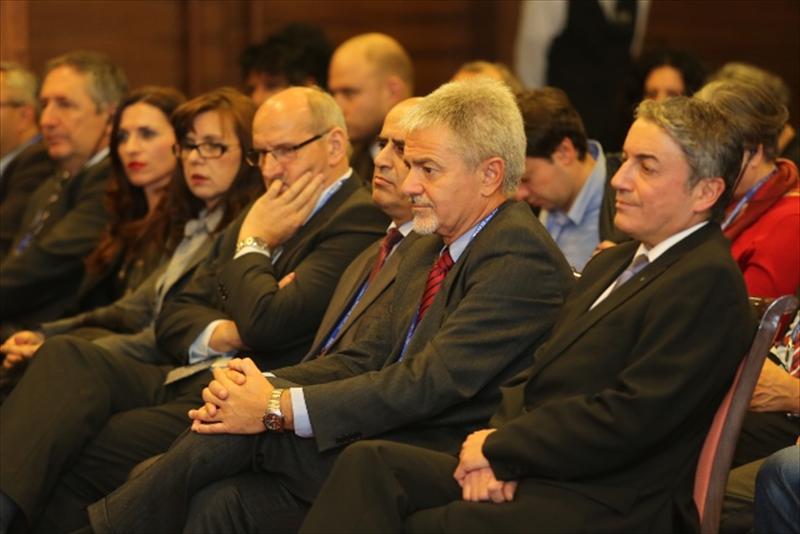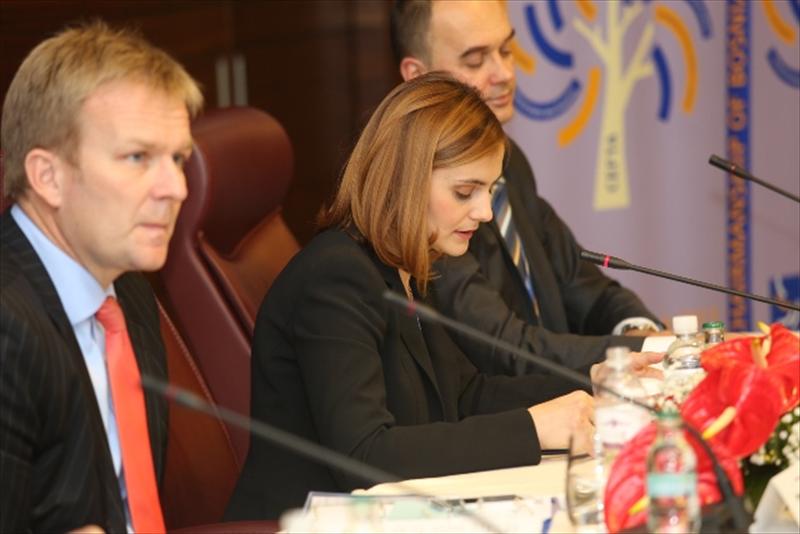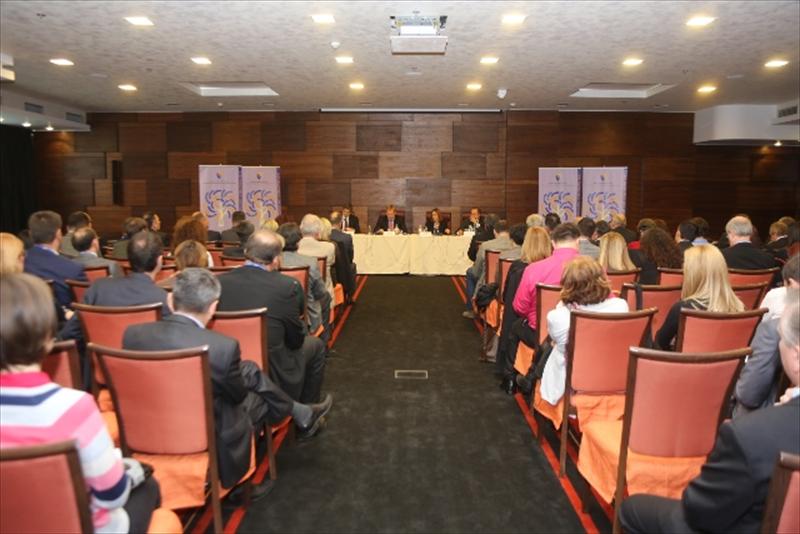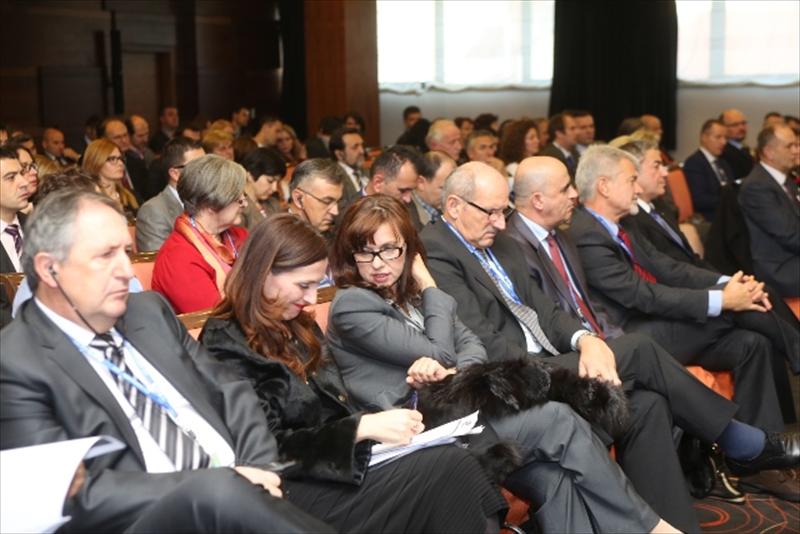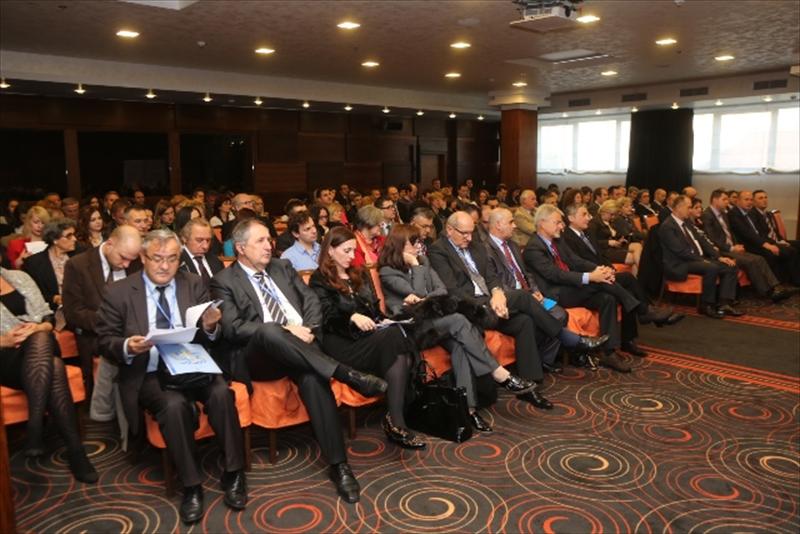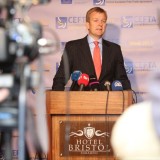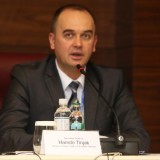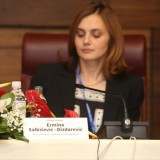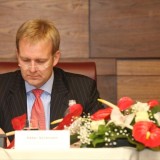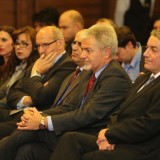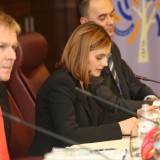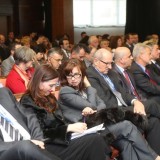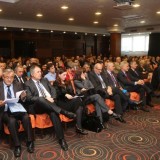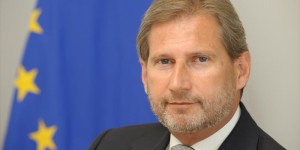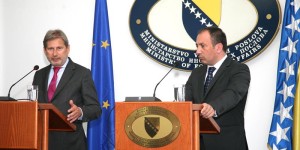Deputy Minister Salkičević-Dizdarević
Honoured Guests,
Ladies and gentlemen,
Let
me begin, first of all, by thanking the BiH Ministry of Foreign Trade
and Economic Relations, and Deputy Minister Salkičević-Dizdarević, for
inviting me here today to speak at the main event of Bosnia and
Herzogovina’s year in the Chairmanship of CEFTA.
The BiH chairmanship brings the CEFTA agreement to the end of a cycle.
When the relay torch is passed to the former Yugoslav Republic of Macedonia in January, all parties will have chaired CEFTA.
This
week marks the fifth anniversary since CEFTA decided to make public
their work within the context of a major annual event. This was, indeed,
an important step forwards towards building a higher level of
transparency and openness, and it is certainly worthy of note here
today.
CEFTA has matured greatly since its beginnings.
It
was no surprise, therefore, that CEFTA received the first ever award as
‘Champion of Regional Cooperation’ from the Regional Co-operation
Council.
We expressed our congratulations then and we do so again with pleasure.
Ladies and gentlemen,
The work of CEFTA has had to continue at a time of a severe global economic crisis.
This
period could have been characterized by many challenges relating to the
implementation of the agreement and hard-to-avoid reflexes to resort to
protectionist measures to live through the crisis.
However, this was not the case.
In
fact, while CEFTA did experience difficulties, they originated more in
the realm of politics than Western Balkans economic life or trade
relations.
In terms of trade policy, CEFTA delivered on all of its goals.
It has surpassed the achievements of its predecessor, the CEFTA for Central and Eastern Europe.
Let me now mention briefly some of CEFTA's ‘flagship’ achievements:
• Agriculture is now fully liberalised;
• Public procurement markets are open;
• State aids are notified;
• Customs procedures are regularly simplified and the work on elimination of non-tariff barriers to trade is on-going.
Yet, despite all of these successes, CEFTA refuses to become complacent.
This year, the parties are to agree on which public services are to be liberalised.
They will harmonise the regulations and agree on mutual recognitions.
The work in the area of technical barriers and phyto-sanitary standards is not over yet.
Rules and standards need to be further improved and aligned with the EU acquis.
Progress in this area will increase regional trade and trade with the EU.
These are all challenges that urgently call for a renewed commitment to CEFTA.
Ladies and gentlemen,
CEFTA is increasingly recognised as a tool for economic growth.
All of its members are relatively small and open economies. Export competitiveness is crucial for their ‘catching up’ process.
Fully
open CEFTA markets pave the way to better performance in trade with the
EU. A fully functioning CEFTA is a sound basis to exploit fully the
potential of the SAA agreements and thus with the EU Single Market.
CEFTA
is an effective and important platform for learning from best practice
in the region in support of competitiveness. Clearly though, progress in
the CEFTA path has happened at different speeds in each of the CEFTA
parties.
The interdependence of CEFTA and the EU are clearly
reflected in the fact that the Parties that have been reforming faster
are now further in their respective EU integration processes.
The example of Croatia becoming the 28th EU Member State is a case in point.
When
I mention CEFTA's potential for trade with the EU, it is important to
say a little more about how the EU and the European Commission see
CEFTA.
Over the last seven years, our relationship has been one of constant evolution.
The
EU was closely involved in CEFTA's creation by requesting that the many
bilateral agreements that existed in the region prior to 2006 be
replaced by a multilateral equivalent.
In the next phase, we
needed to demonstrate that the implementation of CEFTA is a key part the
Stabilisation and the Association Process.
It is pleasing to
observe that this view is also shared by all parties and that economic
benefits of the agreement are recognised at the same time.
Based
on our positive experience with the evolution of CEFTA, the European
Commission has been gradually increasing its investment into regional
trade issues.
So much so that our current support to various
regional trade project amounts to almost €2 million per year. This
figure has never been higher.
Besides witnessing positive
developments, the EU could unfortunately witness how CEFTA rules, which
are not yet aligned with the EU acquis, prevent trade with the EU.
Under
CEFTA, BiH and Croatian trade was flourishing. However, since July 1st
almost no BiH agricultural product of animal origin can be exported to
its traditional Croatian (and now European Union) market because of the
lacking compliance of BiH law with the EU requirements.
We have
worked for years closely together with the relevant authorities in
Bosnia and Herzegovina at all levels of governance to support them
technically and legally in the transposition of the EU acquis and to
meet the European standards in sectors such as food safety and
veterinary issues, but results were not in place when needed.
More political will is therefore needed to adjust national CEFTA legislations to the EU law.
Let me mention in this context one positive example, where needed political will exists:
An
administrative agreement of the key authorities in Bosnia and
Herzegovina at State and Entity level and all Cantons was recently
concluded with regard to the setup of an EU-compliant system for the
accreditation of establishments in the milk and dairy sector to this
end. If the EU audit of the proposed system is positive, EU and in
particular Croatian markets can be open for milk and dairy producers and
traders from Bosnia and Herzegovina. This temporary measure will not
make the legislative alignment obsolete.
Ladies and gentlemen,
Once again – let me congratulate Bosnia and Herzegovina for the organisation of this year's CEFTA week.
I am told from my colleagues who have been observing the history of the CEFTA week that its agenda has never been this full.
I take some pride in the fact that this was made possible by a dedicated IPA project to support the chair in office.
Perhaps other parties will start using this best practice.
Deputy Minister,
Ladies and gentlemen,
I wish you all the best with the event over the next two days.
I encourage the parties to take ambitious decisions on the trade agenda when they meet in the joint committee on Wednesday.
Thank you.
END
CHECK AGAINST DELIVERY

